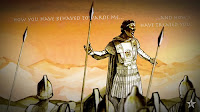In a brilliant ten-year campaign, Alexander and his Macedonian Army conquered much of the known world, from Egypt to the Indus River. In 324 BC they returned to Opis, near modern Baghdad, where Alexander ordered some of his Macedonian veterans to return home. But angry at perceived insults to their honor, as well as Alexander's adoption of Persian customs... they mutinied.
According to the Ancient Historian Arian, Alexander executed 13 ringleaders before confronting the army. Alexander's exact words are not known but modern historians believe Arian records the essence of a real moment of history, passed down by eyewitnesses.
The Speech Starts Now:-
What I’m about to say isn't meant to stop you returning home. As far as I care, you can go wherever you wish. But I want you to know how you have behaved towards me, and how I have treated you.
Under him, you began living in cities, with good laws and customs. And he turned you from slaves into rulers over those very barbarians who used to plunder your land. He conquered most of Thrace, taking the best harbors so there was trade and prosperity, and put the mines to steady work.
The Thessalians - They used to terrify you! Well, we rule them now! The Athenians and Thebans, always looking for a chance to attack Macedonia, were so humbled – myself playing my small part in the war - that they no longer take tribute from Macedonia, but instead depend on us for their protection! My father went to the Peloponnese and put their house in order. Then he was declared supreme commander of all the Greeks for the campaign against the Persians – an honour not just for himself, but for all Macedonians.
 All for the sake of your lives, your glory and your wealth. And yet here I still am, leading you, as conqueror of land and sea, rivers, mountains and the plains. We’ve celebrated our weddings together. Many of your children will be cousins of my own.
All for the sake of your lives, your glory and your wealth. And yet here I still am, leading you, as conqueror of land and sea, rivers, mountains and the plains. We’ve celebrated our weddings together. Many of your children will be cousins of my own. And now I wanted to send back some of you who’ve been wounded or crippled, or have grown old, to be welcomed back home as heroes.
But since you all wish to go, then all of you – go! Go home and tell them that your king, Alexander, conqueror of the Persians, Medes, Bactrians, and Scythians;
Well the Article is not finished yet , let talk about this great victorious's early life and education....
His early life and the Great tutor (Aristotle):-
Alexander the Great, also known as Alexander III of Macedon, was the king of Macedonia from 336 to 323 B.C. He was the conqueror of the Persian Empire and is considered to be one of the greatest military geniuses of all times. Born as the son of Philip II, King of Macedonia, he spent his early years observing the administration of his father and witnessed how the king transformed Macedonia into a great military power. Brave and courageous from an early age, Alexander first displayed his prowess when he successfully tamed an unruly stallion when he was just 12. As a young boy he had the good fortune of being tutored by the great Greek philosopher, Aristotle, who imbibed in Alexander a love for knowledge and stimulated his interest in the fields of science, medicine, literature and philosophy. Alexander ascended the throne at the age of 20 following the assassination of his father. His father had been a great conqueror and being his son, Alexander was determined to take forward his legacy. He embarked on a series of extensive military campaigns and created one of the largest empires of the ancient world by the time he was 30.
The Conqueror:-
Families in ancient times could expect very high child mortality, but noble children who made it to adulthood could easily live into their 50s, or even past their 70s, so Alexander’s death was premature. He died in Babylon in 323 BC, Aged just 32.
This Article about the greatest speech in the history to his army, was the centre of our interest, that is why i could not through the light in detail on various aspects of Alexander's Life and his major accomplishments. But you would get them very soon.
Regards











